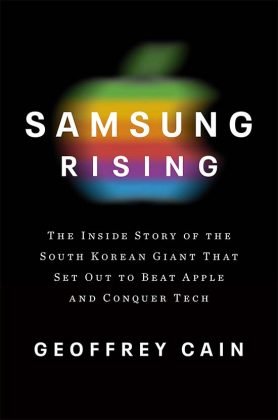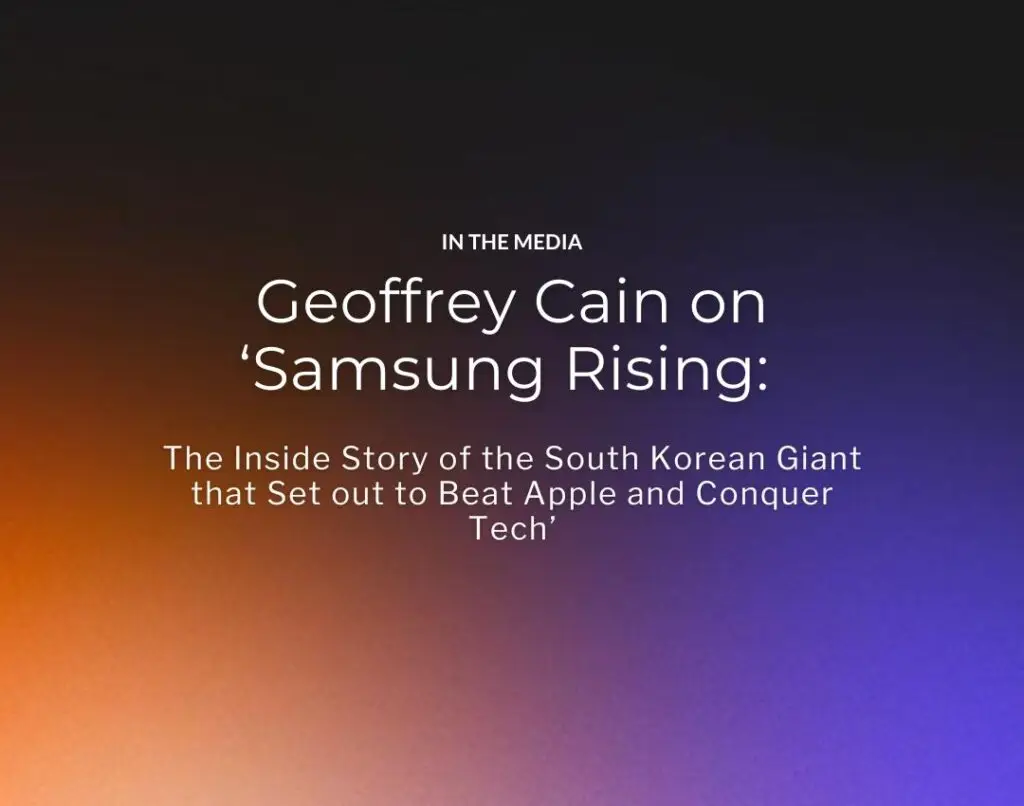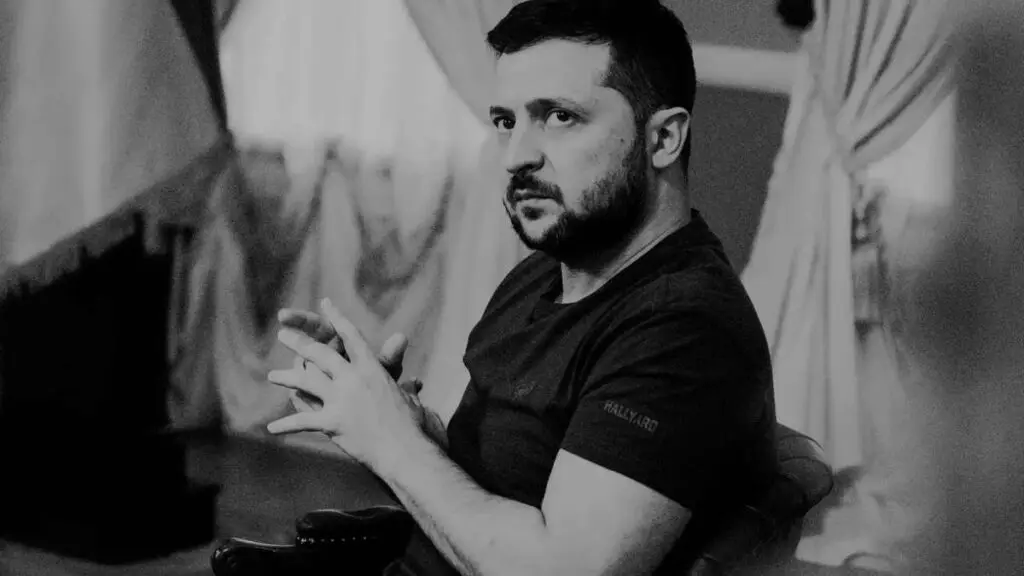BY BOBBY MCGILL – MAR 23, 2020

he rise of Samsung to become one of the most widely recognizable brands in the world is a remarkable success story. And, unlike most global brands, the Samsung name has become synonymous with South Korea itself, where its presence remains firmly rooted as part of the nation’s brand identity.
First founded in 1938 as a small trading company selling locally grown produce and dried fish, the company founded by Lee Byung-chul has evolved into a global powerhouse with a presence in nearly all of our lives across product and service lines including electronics, shipbuilding, construction, insurance and a host of others under the Samsung name.
We recently caught up with Geoffrey Cain to discuss his new book, Samsung Rising: The Inside Story of the South Korean Giant that Set out to Beat Apple and Conquer Tech. Over the course of our conversation, he talks about the Galaxy 7 fiasco, how deeply embedded the Samsung brand is South Korea’s nation brand, the company’s “military-like” approach with its workforce, South Korean creative culture, and more.
McGill: You open the book with the Galaxy 7 fiasco and Samsung’s response, writing that the “underlying problem wasn’t just a snafu with the power source. It was a problem that began with the corporate culture, which the company had long been trying to reform.” Tell us more about the “problem” and how efforts to reform have progressed.
Cain: As I dived into the Samsung empire as a foreign correspondent, I found a corporate culture that doesn’t exist in the Silicon Valley firms. Samsung behaves like a military. It makes business decisions as if executing battle orders. Samsung executives embrace a strategy of watching, waiting, and studying their competitors. And when the market looks right, the founding Lee family will make a major, long-term decision. That decision could be to invest in a new type of semiconductor, or it could be to go head-to-head with Apple with a new smartphone.
Samsung executives don’t question it. They’re trained to execute. They execute fast, efficiently and ruthlessly. It’s a business model that has worked wonders for Samsung, now the maker of almost every premium device and the components inside them — a lucrative position in the tech world.
But in my interviews, I found that the Galaxy Note 7 recall exposed the liabilities of Samsung’s military-like corporate culture. Employees were discouraged from speaking up. At first, executives and managers refused to believe the reports of phones catching fire. One manager told an employee that the reports are “nonsense” and that Apple phones, he believed, were really the faulty ones.
” I found that the Galaxy Note 7 recall exposed the liabilities of Samsung’s military-like corporate culture. Employees were discouraged from speaking up. At first, executives and managers refused to believe the reports of phones catching fire.”
By then, it was too late. Samsung instigated a sweeping recall, then put out dangerous replacement devices, and then recalled the phones again. On the order of Samsung heir and Vice Chairman Jay Lee, they killed the Note 7 altogether. But that decision came after many weeks of stumbling and stammering around the devices, even though they posed a danger to the public.
McGill: You write that Samsung “saw itself as misunderstood and mistreated— that the press and the shareholders were out to get it.” What are we to make of this internal perception in terms of Samsung’s core brand DNA and the role it played in its remarkable rise?
Cain: Samsung recruits are taught to be proud of their company. They see themselves as the best. Former Samsung executives even described to me what they called the “indoctrination” and “brainwashing” of new employees through events like the Samsung Summer Festival, a mass games ceremony that Samsung employees, in interviews with me, compared to North Korea’s Arirang Mass Games. Samsung Electronics makes up about a fifth of South Korean exports. The company is wound up in the fate and future of its country, South Korea.

Understandably, the patriotism of Samsung executives, formerly called “Samsung Men,” can create a hive mentality. Samsung is known for its paranoia and distrust of outsiders. So when things go sour — say, the Galaxy Note 7 starts catching fire, or Apple sues Samsung for patent infringement — I’ve seen a gut reaction internally to react angrily and blame the messenger.
The “messenger” could be shareholders, the press, labor unions, government regulators. I’d say that style of passive and bureaucratic public relations strategy, followed by angry reactions to the slightest criticism, is encoded in Samsung’s DNA since the company is so proud.
McGill: The book talks about the deep connection between Samsung and South Korea in terms of the nation brand. You quote then opposition leader Moon Jae-in saying that Koreans “take pride in the Samsung brand representing South Korea.” Beyond economic importance, how is it that one company became so deeply tied to a nation’s brand not just by the outside world but by the citizenry itself?
Cain: This goes way back into Korean history. From the 1950s to 1980s, three South Korean dictators put the chaebol, or family-run conglomerates like Samsung and Hyundai, to work building the nation from the rubble of the Korean War.
Korea’s business and political leaders modeled the chaebol on the success of Japan’s zaibatsu, similar family conglomerates like Mitsui and Mitsubishi. The terms chaebol and zaibatsu have the same Chinese character and the same meaning.
“Former Samsung executives even described to me what they called the ‘indoctrination’ and ‘brainwashing’ of new employees through events like the Samsung Summer Festival, a mass games ceremony that Samsung employees, in interviews with me, compared to North Korea’s Arirang Mass Games.”
The four big chaebol became major suppliers of semiconductors and components to the PC boom, and made inroads with their cars and heavy industry. And the success of Samsung and other companies was so closely tied to the success of Korea. So while Samsung doesn’t push its Korean origins in its marketing materials overseas, it’s had a hard time at home divorcing the idea of the company from the idea of the nation.
McGill: Fueling Samsung’s incredible rise was the ability to manufacture quality hardware, faster than competitors, but its marketing abroad early on was described as “frustratingly subpar.” What turned that around? Was there a particular campaign that marked a turning point?
Cain: During my reporting, I heard from Samsung employees about a star marketer named Todd Pendleton in a Texas office called Samsung Telecommunications America. Todd’s team was tasked with finding a clever way to best Apple through marketing and advertising. The early Galaxy smartphones had better hardware than the iPhone in many areas. But Samsung lacked a storyline.
Samsung wasn’t telling a story to its customers, while Steve Jobs had his cult at Apple. Apple sued Samsung in some 50 lawsuits around the world, accusing Samsung of being a copycat. It had glowing media coverage.
Todd’s team decided to flip the narrative. What if Apple was bullying its way into a monopoly, and Apple fans were actually sheep for Steve Jobs who fancied themselves as creative? So they decided to release a series of commercials that poked fun at Apple users standing in line for nine hours, for what was really a minor upgrade from the previous iPhone.
“Todd’s team decided to flip the narrative. What if Apple was bullying its way into a monopoly, and Apple fans were actually sheep for Steve Jobs who fancied themselves as creative?”
A few Samsung users would be standing on nearby street corners, tapping away at their phones, and would show the Apple users, deflated, that Samsung already had the features, customizability and data speeds that Apple was promising in the next iPhone. For a while, the campaign worked. Android users were becoming a tribe, and Samsung wanted to be their leader. Samsung, once an obscure hardware manufacturer, became the only company mentioned in the same breath as Apple.
McGill: The book offers up a behind-the-scenes look at Samsung’s campaign to defeat Elliott Management’s opposition to its merger with Cheil Industries Inc., which led to a massive corruption scandal in Korea. Tell us more about that and it’s drivers.
Cain: Samsung’s leaders had a conundrum. They wanted Vice Chairman Jay Lee, the heir to the Samsung empire, to become the next Chairman. His father, Chairman Lee Kun-hee, suffered a heart attack in 2014, and then a stroke, and hadn’t been seen in public for a year. To become the next Chairman, Jay would need to consolidate the complex shareholding structure and raise his shareholding value, in part so he could pay off a massive inheritance tax should his father die.
“South Korea has elevated its creative culture enormously since I first arrived in 2009. Back then, no one would bother to read or publish a book on Samsung. But now Korea is everywhere. The crowning achievement was when Parasite became the first foreign film to win the Oscars.”
In the summer of 2015, Samsung decided to consolidate Jay’s control through the controversial acquisition of Samsung C&T by another company, Cheil. Samsung C&T shareholders felt ripped off since they were getting one Cheil share for every three Samsung C&T shares. Elliott, a feared New York hedge fund, waged financial war. Korean business tabloids responded with an anti-Semitic media campaign against Elliott, writing that
“Jewish money has long been known to be ruthless and merciless.” Reporting on the fiasco, I was shocked that a business dispute could descend into anti-Semitism in 2015.
In the end, Samsung pushed through the merger, fighting off the shareholder battle from Elliott. A significant portion of the pro-Samsung vote came from the National Pension Service. Prosecutors later discovered that Samsung executives had paid bribes and bought horses for the South Korean President Park Geun-hye and her crony, Choi Soon-sil, the daughter of a charismatic spiritual leader.
Vice-Chairman Jay Lee was arrested, sentenced, and served a year in prison out of a five-year sentence. Then an appeals court let him out while upholding part of his bribery charge. He now awaits his final verdict. President Park was impeached and sentenced to 24 years in prison at the time. Writing a book about the saga, I also felt like this could inspire an episode of the HBO drama Succession, with a similar plot that goes deep into the rabbit hole.
McGill: Having spent a great deal of time in South Korea, what is your current take on the country’s creative culture overall in terms of developing brands for consumers globally?
Cain: South Korea has elevated its creative culture enormously since I first arrived in 2009. Back then, no one would bother to read or publish a book on Samsung. But now Korea is everywhere. The crowning achievement was when Parasite became the first foreign film to win the Oscars.
I think Korea’s success goes beyond hard work and nation-building. Before, there was an incredible streak of nationalism tied up in Korean film, music and culture being exported globally. People seemed to believe their job was to sell “Korea,” more than only music, film and food, to the outside world. The mission was a patriotic one, not an artistic one.
Times have changed. I don’t see as much patriotism in the brands as I used to. And I think that the brand-building companies have also realized the pointlessness of trying to market a country. Parasite was successful because it was a great film, with a story of inequality that many people all over the world could relate to. Parasite wasn’t marketed as a “Korean film.” Even its director Bong Joon-ho said his film was supposed to have broad appeal. In the same vein, people took to BTS because they liked the messages and the music and the personalities, not because they liked “Korean music.”
McGill: You interviewed more than four hundred sources for this book and invested considerable time and effort into research documenting the Samsung story. What’s next in the Geoffrey Cain story?
Cain: I put a decade of reporting and research into Samsung Rising. It was an incredible project. Now I live in Washington DC and Istanbul, where I’m on contract for a top-secret book project whose subject has huge implications for the future of humanity and its technology. I also co-run a consulting firm called Inika Terra. We do strategic and geopolitical forecasting for clients in volatile markets around the world.
See Also:






